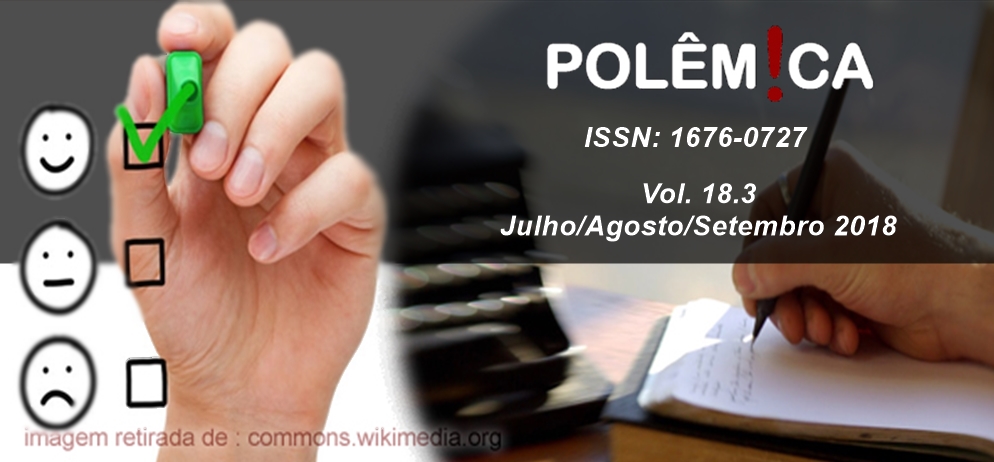DE QUEM É A RESPONSABILIDADE PELO FRACASSO ESCOLAR?
DOI:
https://doi.org/10.12957/polemica.2018.39423Resumen
Resumo: O presente estudo se constitui de uma reflexão sobre o percurso desenvolvido por professores e alunos de cinco turmas do 6º ano do Ensino Fundamental de BH, no ano de 2017. A partir da discussão dos processos avaliativos e estratégias pedagógicas desenvolvidas pelos professores, buscou-se problematizar o trabalho escolar efetivamente realizado, tendo em vista a necessidade de identificar aspectos que incidem sobre a qualidade do processo educativo. Foi feita a análise dos parâmetros de aprovação e reprovação adotados pelos professores, bem como dos elementos que subsidiaram a decisão do Colegiado Escolar sobre o futuro escolar dos alunos selecionados, confrontando-os com as observações da equipe de coordenação pedagógica. Fundamentando-se nas contribuições de Bernard Charlot, Miguel Arroyo e Maria Helena Souza Patto sobre o fracasso escolar e nas discussões desenvolvidas por Cipriano Luckesi, Philippe Perrenoud e Edgar Morin acerca dos processos de avaliação escolar e da complexidade do processo educativo, espera-se despertar inquietações e explicitar os limites das diferenças ideológicas percebidas no trabalho educativo e contribuir para a construção de uma proposta de trabalho que explicite as diferenças e se comprometa profundamente com a reflexão crítica sobre a própria prática. Os resultados demonstram que a prática profissional ainda está calcada em vícios históricos e culturais que excluem os segmentos mais vulnerabilizados da sociedade e denunciam a irracionalidade de um sistema excludente, classificador, opressor e individualista, contrapondo-se ao discurso da universalização do ensino e do direito a uma educação pública de qualidade.
Palavras-chave: Avaliação escolar. Complexidade. Prática profissional.
Abstract: The present study consists of a reflection on the course developed by teachers and students of five groups of the 6th grade of BH Elementary School in the year 2017. From the discussion of the evaluation processes and pedagogical strategies developed by the teachers, to problematize the adequacy of the school work effectively carried out, considering the need to identify aspects that affect the quality of the educational process. The analysis of the approval and disapproval parameters adopted by the teachers, as well as the elements that subsidized the decision of the School Collegiate about the students' school future, were compared with the observations of the pedagogical coordination team. Based on the contributions of Bernard Charlot, Miguel Arroyo and Maria Helena Souza Patto on school failure and in the discussions developed by Cipriano Luckesi, Philippe Perrenoud and Edgar Morin on school evaluation processes and the complexity of the educational process, it is expected to arouse uneasiness and to explain the limits of the ideological differences perceived in the educational work and to contribute to the construction of a proposal of work that explains the differences and is deeply committed to the critical reflection on the practice itself. The results show that professional practice is still based on historical and cultural vices that exclude the most vulnerable segments of society and denounce the irrationality of an exclusionary, classifying, oppressive and individualistic system, in opposition to the discourse of universalization of education and law to a quality public educationKeywords: School evaluation. Complexity. Practice.
Descargas
Publicado
Cómo citar
Número
Sección
Licencia
Cabem ao autor/autora os direitos autorais dos artigos publicados na Polêm!ca, resguardando-se à revista o direito de primeira publicação. Cientes, revista e autores/as, que todos os artigos são de uso gratuito, para fins educacionais e não-comerciais, permitindo que outros remixem, adaptem e construam sobre o trabalho, desde que citada a fonte, quando da sua utilização integral ou parcial, de acordo com a licença Creative Commons CC BY-NC.
O(s) autor(es) tem/têm autorização para assumir contratos adicionais separadamente, para distribuição não-exclusiva da versão do trabalho publicada nesta revista (ex.: publicar em repositório institucional ou como capítulo de livro), com reconhecimento de autoria e publicação inicial nesta revista.
Respeitando a licença autoral adotada pela Polêm!ca, estimulamos nossos leitores a promover, refletir e escrever, a partir das nossas publicações, incluindo nas citações o link para o artigo disponível no site da Revista Polêm!ca, sempre que um artigo for citado ou replicado, e observando a grafia correta do nome da revista Polêm!ca.
Todo o conteúdo de terceiros (imagens, trechos, citações, etc.) deverá possuir referências a sua fonte original adicionadas como notas de rodapé ou referências bibliográficas com sua devida identificação.
Artigos submetidos que contiverem citações, tabelas ou imagens extraídas de outras publicações não serão aceitos, caso possuam mais conteúdo de terceiros do que conteúdo original.

Revista Polêm!ca está licenciada com uma Licença Creative Commons Atribuição-NãoComercial 4.0 Internacional.



